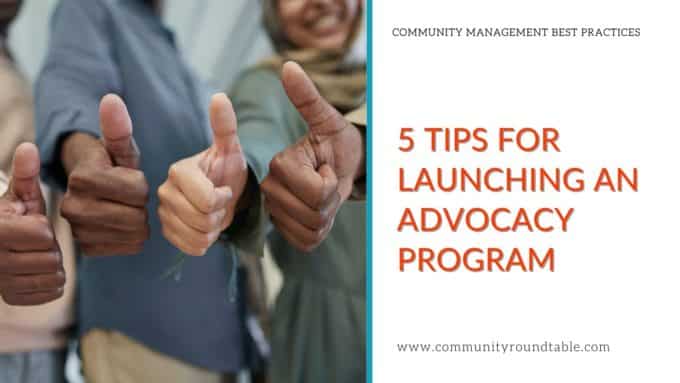There’s no better feeling than knowing someone has your back. Your community can get those same warm fuzzies with an advocacy or leadership program. No formal leadership or community advocacy program in place? It’s time to consider starting one.

What’s an advocacy program?
The easiest way to picture a community advocacy program is as a bridge. One side is the active and engaged community, like a block party. The other side of the bridge is dark and quiet, this is where your target audience — the less active members — lives. No block party here, more like everyone’s home. Advocacy program members are the bridge between the social butterflies and the lurkers/learners. They’re engaged and sing the community’s praises while welcoming others to the party (without scaring them away).
Beyond bridging, community advocacy and/or leadership programs can also be a good indicator of your overall community health. Communities with advocacy programs are often more mature, have more dedicated staff, can show value, have executive buy-in, engaged product team and subject matter experts, greater amounts of user-generated content, higher levels of conversation vs. content sharing, and more robust community tools. Whew!
TL/DR: Community advocacy programs are a sign of a healthy community.
Sounds good? Onward!
Starting your program
- When building a community advocacy or leadership program, KISS your policies. (Keep It Seriously Simple.) If you try to make the rules and guidelines around the advocacy program too complex at first, you’ll scare away potential community advocates. Instead, add policies, guidelines, and expectations as your program grows.
- Set expectations from the beginning. This is critical to protect your program participants from feeling used and abused. As Brené Brown says, “clear is kind,” and setting expectations from the get-go is about as clear (and therefore kind) as it can get.
- Ask questions and listen. You know who your super users are already, these same members will be great candidates for your first participants! Ask them for feedback on your plan, and then LISTEN to their responses. Looking for a smash-hit program, this is how you accomplish that! When your super users like the program (and can refine it) your built-in advocates will be excited about it, and share with those who could benefit.
- Recognize advocates’ contributions. Go back to the lessons you learned in kindergarten and remember to thank your advocates and community leaders for their help. No need for complicated or in-depth, just ensure it’s heartfelt.
- Have a member entrance and exit plan. Burnout’s real; even your most enthusiastic members will need a break. That’s where clearly defined onboarding and offboarding processes helps. When you have these plans documented, you can help smooth the transition between new and “retiring” advocates.
We want to know: Do you have a formal community advocacy or leadership program in place? What tips would you add for someone starting a new program from scratch? Let us know!
